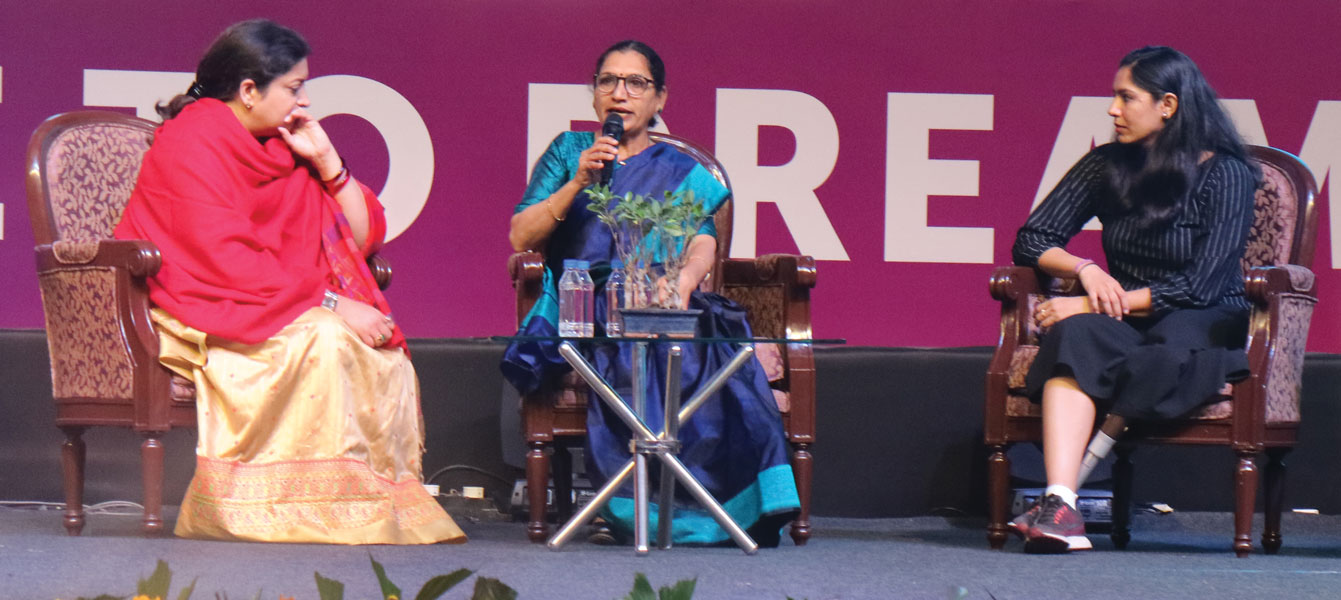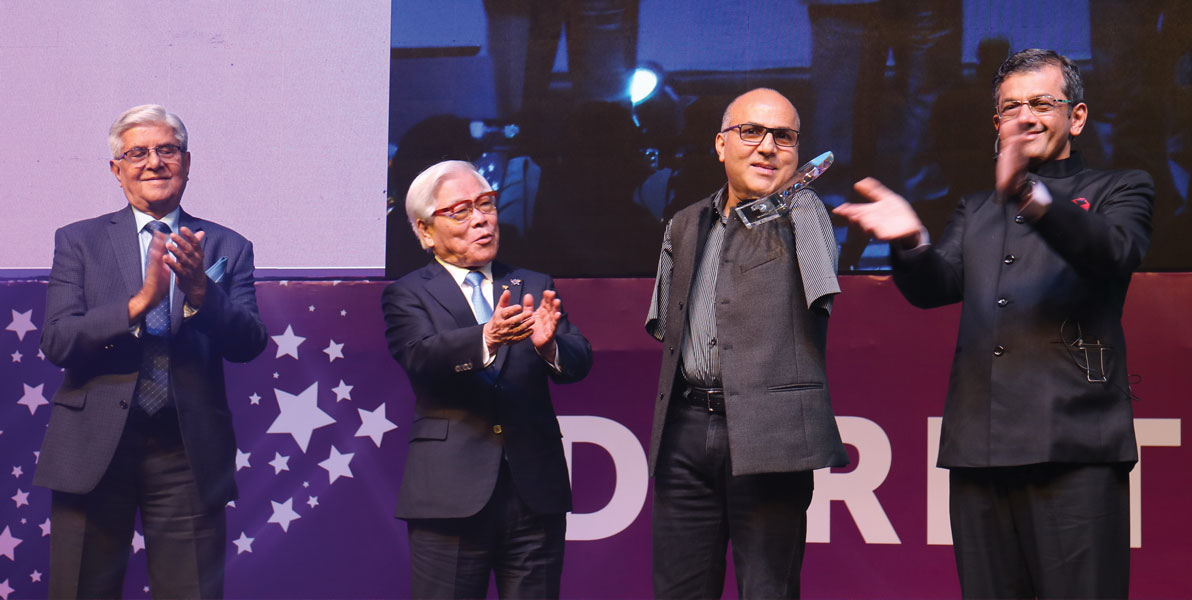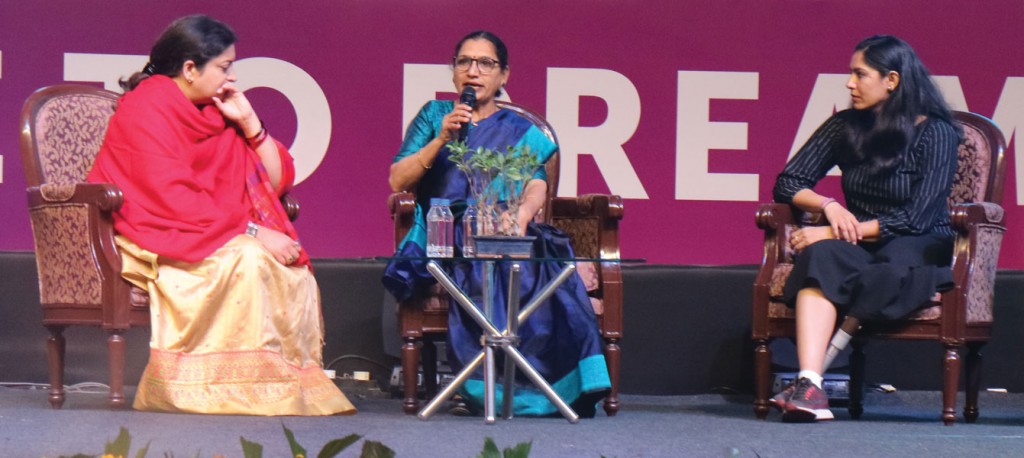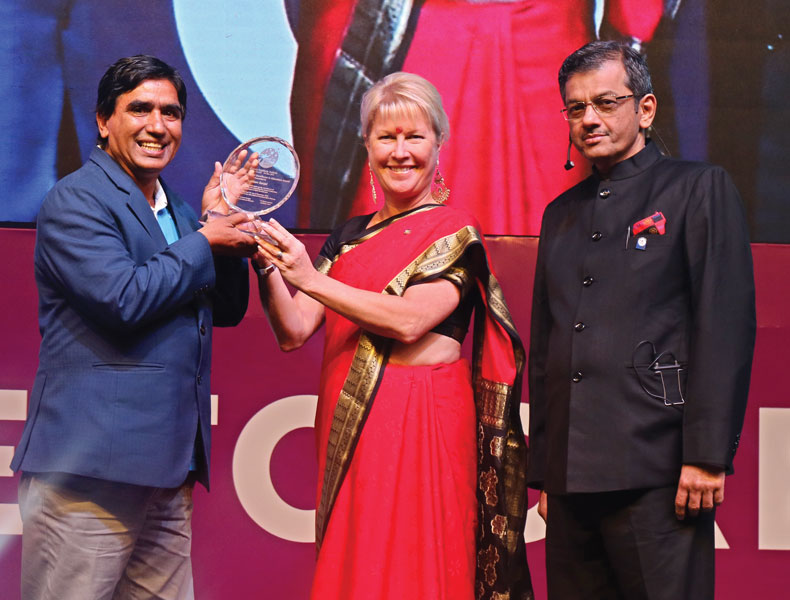
Dream big and follow your dreams and never let any obstacle disturb your path, was the watchword for these achievers who were honoured with the Dare to Dream Awards at the Indore Institute.
Para-badminton world champion Manasi Joshi was a recipient. Having lost a leg in a road accident eight years ago, she recently won gold at the championship in Switzerland and is preparing for the Paralympics to be held in Tokyo in Aug 2020. She has been playing the sport since childhood. “I never dreamt I will play at the international level. I started playing the game mainly for my rehab,” she said, adding that her desk job, as a software engineer, was keeping her sedentary and the sport was an exercise to keep her agile.
She uses two prostheses. A titanium microprocessor-based electronic one for walking. It lasts for 5 to 7 years, costs around ₹25 lakh and needs to be charged regularly. She also uses a carbon fibre foot for playing.
“I wish the prosthetic companies could design prostheses specific to badminton as a sport,” she said. Against forward movement needed in athletics, running or walking, badminton requires sideways and backward movement. “I have to train my muscles to adapt to movements suited for badminton,” she said.
Para sports is yet to gain attention in India, said Manasi. Such achievements are not included in the sports section, rather they are highlighted on other pages in dailies and treated as motivational. This attitude needs to change. “We should be recognised rightfully for our successes, irrespective of our challenges, just as a businessperson with disability is celebrated for his success. After all, all of us have challenges. Some are visible and some are not,” she pointed out.

Prompted for a message for Rotarians, she said, “There is a shot in badminton called smash. So whatever is a ‘smash’to us, we should be ready with a strong defence.”
Double amputee Vikram Agnihotri from Indore is the first Indian without arms to get a driving licence and bring an amendment in the Indian Motor Vehicles Act. In fact, the story of this 48-year-old motivational speaker and a car racer is one of determination and perseverance despite odds.
His mother, who passed away recently, was the architect of his life since childhood, particularly when his arms were burnt when he was seven. “She encouraged me to dream big and work harder than others for my dreams to come true and not let the physical challenge come in the way.”
He went to a normal and not a special school. “I had an inclusive education from the beginning, graduated from an American University, and then did a Masters in Economics. Then after a gap of 23 years, did an LLB.”
He has trained his right foot to do everything, from driving, writing, typing to shaving and even brushing teeth, over the years. “What others do with their hands, I do it with my feet,”
he said.
Agnihotri participated and won the 2017 Malwa Adventure, a prestigious car rally. “That was the icing on the cake for me.” So far, he has had four podium finishes, including the iconic Desert Storm, the Indian version of Paris-Dakar Car Rally, in which he came third, driving his custom-
designed Maruti Celerio in the professional category.
“You are never too old to dream big, I am almost 50 now and never stopped dreaming as my best is yet to come. Life is too precious to waste on small things. Just follow the 3Ds — dare, dream and do.”
Uttam Sanjel, Founder, Samata group of schools, recalled the challenges and odds he faced while setting up the first ‘bamboo school’ to provide education for underprivileged students in Nepal in 2001. At that time, he neither had the money nor experience as an educationist to run a school. But during his interactions with impoverished children, he found that the only way “to empower them is to give them good, quality education and make them independent. ”
Now, he has 80 Samata schools across Nepali districts charging just ₹100 a student and it has also spread its wings to India, Bangladesh, Sri Lanka and Myanmar. The Samata Hospital offers free treatment to the poor.
In the next 3–5 years, Sanjel is confident of opening schools in 50 countries with support from his well-wishers and friends from Rotary. “If we want to stop terrorism and put an end to all the bad things in society, we have to invest in education of our children,” he said and urged the large gathering of Rotary leaders at the Institute to support his academic initiatives in the SAARC region to usher in a peaceful, better world.
Triveni Acharya has rescued more than 5,000 girls across the country from sex trafficking through the Rescue Foundation that she co-founded with her late husband Balkrishna Acharya. It all began when she chanced upon a girl sitting outside a brothel in Kamathipura in Mumbai where Triveni, as an investigative journalist, had gone on an assignment. The girl revealed that she was brought from Nepal and was being forced into prostitution. “That night I was deeply disturbed and told my husband that we should do something to save these children.” With police intervention the couple rescued the Nepali girl and others from the brothel. “Everyone had a story. Some were kidnapped; some were living in extreme poverty and were enticed with the promise of a good job and a better life.”
The couple realised that there were organisations that worked for orphans, disabled people and the elderly, but there were hardly any to help these young girls. “We knew we had to do something about it, and that’s how the Rescue Foundation was born in 1996,” she said. The shelter helps in rehabilitating the rescued girls through health camps, counselling, nutrition and legal aid.
As long as the demand for prostitution remains, trafficking will continue, said Triveni. “It’s just like drugs. No matter how expensive or dangerous it is, the addicted will do whatever it takes to get them. It’s the same with prostitution. Which is why we’ve been working with the government to prohibit and prosecute customers, so that people will be afraid to enter such areas.”
Calling for a joint fight against non-communicable diseases in the country, Dr Preetha Reddy, vice-chairperson, Apollo Hospitals, said, “we have a huge problem and unless there is drastic change in lifestyle, we can’t usher in better healthcare for all.”
Today there is an acute shortage of hospital beds, “so we have to work together to keep people out of hospitals. As Rotarians, all of you are good influencers in society and our responsibility is also to keep people healthy. Rotary governors have a good ecosystem that they could put to good use to convince people on the need to be healthy.”
Our forefathers led a life of natural wellness, “but somewhere down the line, we lost the connect with the ancient system of healthy living.” She called upon Rotarians to be “proactive and develop channels of communications on healthy living in the communities and take them far beyond.”
Pictures by V Muthukumaran







